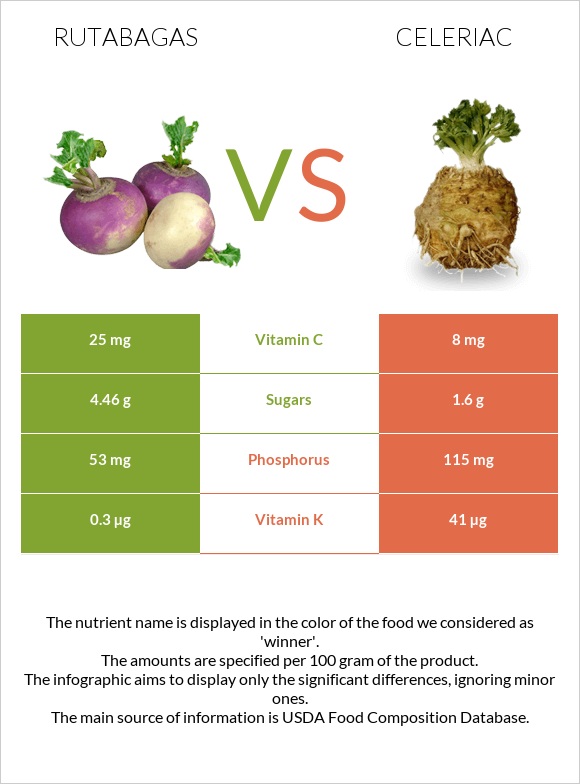Rutabagas vs. Celeriac — In-Depth Nutrition Comparison
Compare
What are the main differences between rutabagas and celeriac?
- Rutabagas are richer in vitamin C, yet celeriac is richer in vitamin K and phosphorus.
- Celeriac's daily need coverage for vitamin K is 34% higher.
- Rutabagas have 3 times more vitamin C than celeriac. Rutabagas have 25mg of vitamin C, while celeriac has 8mg.
- Celeriac contains less sugar.
- Celeriac has a lower glycemic index than rutabagas.
We used Rutabagas, raw and Celeriac, raw types in this comparison.
Infographic

Infographic link
Mineral Comparison
Mineral comparison score is based on the number of minerals by which one or the other food is richer. The "coverage" charts below show how much of the daily needs can be covered by 300 grams of the food.
| Contains less SodiumSodium | -88% |
| Contains more IronIron | +59.1% |
| Contains more CopperCopper | +118.8% |
| Contains more ZincZinc | +37.5% |
| Contains more PhosphorusPhosphorus | +117% |
| Contains more ManganeseManganese | +20.6% |
Vitamin Comparison
Vitamin comparison score is based on the number of vitamins by which one or the other food is richer. The "coverage" charts below show how much of the daily needs can be covered by 300 grams of the food.
| Contains more Vitamin CVitamin C | +212.5% |
| Contains more Vitamin B1Vitamin B1 | +80% |
| Contains more FolateFolate | +162.5% |
| Contains more Vitamin EVitamin E | +20% |
| Contains more Vitamin B2Vitamin B2 | +50% |
| Contains more Vitamin B5Vitamin B5 | +120% |
| Contains more Vitamin B6Vitamin B6 | +65% |
| Contains more Vitamin KVitamin K | +13566.7% |
All nutrients comparison - raw data values
| Nutrient |  |
 |
DV% diff. |
| Vitamin K | 0.3µg | 41µg | 34% |
| Vitamin C | 25mg | 8mg | 19% |
| Phosphorus | 53mg | 115mg | 9% |
| Vitamin B6 | 0.1mg | 0.165mg | 5% |
| Copper | 0.032mg | 0.07mg | 4% |
| Sodium | 12mg | 100mg | 4% |
| Vitamin B5 | 0.16mg | 0.352mg | 4% |
| Iron | 0.44mg | 0.7mg | 3% |
| Vitamin B1 | 0.09mg | 0.05mg | 3% |
| Folate | 21µg | 8µg | 3% |
| Fiber | 2.3g | 1.8g | 2% |
| Vitamin B2 | 0.04mg | 0.06mg | 2% |
| Fructose | 1.61g | 2% | |
| Protein | 1.08g | 1.5g | 1% |
| Zinc | 0.24mg | 0.33mg | 1% |
| Manganese | 0.131mg | 0.158mg | 1% |
| Choline | 14.1mg | 9mg | 1% |
| Calories | 37kcal | 42kcal | 0% |
| Fats | 0.16g | 0.3g | 0% |
| Net carbs | 6.32g | 7.4g | N/A |
| Carbs | 8.62g | 9.2g | 0% |
| Magnesium | 20mg | 20mg | 0% |
| Calcium | 43mg | 43mg | 0% |
| Potassium | 305mg | 300mg | 0% |
| Sugar | 4.46g | 1.6g | N/A |
| Starch | 0.4g | 0% | |
| Vitamin E | 0.3mg | 0.36mg | 0% |
| Selenium | 0.7µg | 0.7µg | 0% |
| Vitamin B3 | 0.7mg | 0.7mg | 0% |
| Saturated fat | 0.027g | 0.079g | 0% |
| Monounsaturated fat | 0.025g | 0.058g | 0% |
| Polyunsaturated fat | 0.088g | 0.148g | 0% |
Macronutrient Comparison
Macronutrient breakdown side-by-side comparison
| Contains more ProteinProtein | +38.9% |
| Contains more FatsFats | +87.5% |
| Contains more OtherOther | +40.8% |
~equal in
Carbs
~9.2g
~equal in
Water
~88g
Fat Type Comparison
Fat type breakdown side-by-side comparison
| Contains less Sat. FatSaturated fat | -65.8% |
| Contains more Mono. FatMonounsaturated fat | +132% |
| Contains more Poly. FatPolyunsaturated fat | +68.2% |





